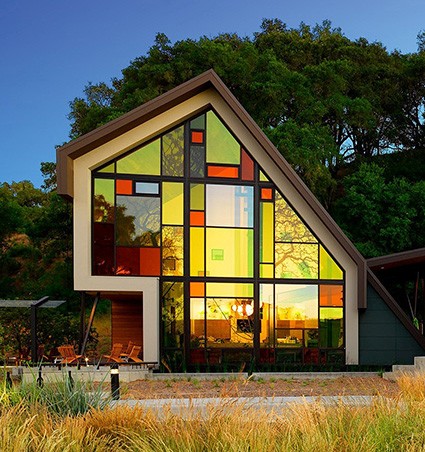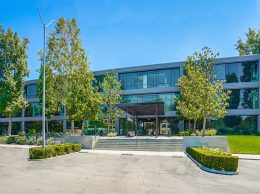Shale Oak Winery turns heads with design and green focus

Shale Oak Winery’s tasting room in Paso Robles is one of the more eye-catching in the area with its colorful, angular facade of stained glass in a geometric pattern.
Something else that caught my eye is that the two-year-old winery is on a Business Times list of the largest private-use, energy-efficient buildings in the Tri-Counties. The 5,873-square-foot facility is LEED certified gold by the U.S. Green Building Council, a recognition that it meets high standards in sustainable development including water savings, energy efficiency and materials selection. LEED stands for leadership in energy and environmental design.
Many wineries in the region take pride in their sustainability practices. Shale Oak is notable for the breadth and detail of its efforts. I got a close-up look at the operation during a recent visit with general manager Johanne Lefebre, winemaker Curtis Hascall and media representative Catherine Jaeger of Jaeger Wine Communications.

Shale Oak Winery in Paso Robles is one of the largest privately owned green buildings in the Tri-Counties. (courtesy photo)
The winery on Paso’s west side is owned by Al Good, a successful grower, wholesaler and exporter of table grapes in the Central Valley. Good wanted every aspect of the winery, tasting room and vineyards to be designed and built with sustainability in mind. Described by his staff as a private man who likes to work behind the scenes, Good has a home on a hilltop overlooking the property.
Shale Oak, which opened in 2011, produces 2,500 cases of wine annually, almost all of it sold at the tasting room and through its wine club. Here is a sampling of the operation’s sustainability features:
Water conservation: Almost no rainwater leaves the property, Hascall said. Five tanks at the highest point on the site can each store 100,000 gallons of water. Rainwater from sloping roofs of the winery and tasting room is directed into a decorative outdoor fountain. When it overflows, the water is sent to a basin at the lowest point on the property, and from there it is pumped to the storage tanks. The water is used for irrigation and toilets.
Bioreactor and bioswale: Tanks collect wastewater and juices from wine production. Bacteria in the tanks cleans the waste and then it goes to a bioswale, a sloping landscape feature, where it percolates into the ground and is naturally filtered rather than flowing into streams. A reverse osmosis system purifies both rain runoff and wastewater.
Electricity: Shale Oak gets about a third of its power from 36 solar panels on a roof overhang of the winery. Solar tubes direct sunlight into the winery building, so there is almost no need for electric lighting during the day. The tasting room’s front of stained glass and strategically located window squares on other walls minimize the use of light fixtures.
Cooling: Windows open automatically and fans bring cool night air into the buildings.
Materials: All the insulation, windows, electrical fixtures and equipment were selected under LEED guidelines for energy efficiency.
Vineyards: The five-acre vineyard next to the winery and a 72-acre vineyard on Paso’s east side are farmed under SIP, or Sustainability in Practice, standards. Among other things, they bar the use of certain pesticides, protect wildlife, conserve resources and set rules for the treatment of workers.
The winery makes use of recycled material to a remarkable degree. The tasting bar counter looks like marble, but it is recycled glass. The wood paneling on the walls looks fresh, but it is recycled lumber from buildings at Vandenberg Air Force Base. An auxiliary tasting bar was built with wood from a demolished bridge on U.S. 101. You can grow flowers from the tasting menu, printed on wildflower seed paper. Jewelry made from nut seeds and purses from cork are popular items on sale at the tasting room, Lefebvre said.
Good, who owns Castle Rock Vineyards in Delano, got into the wine business with the help of Kevin Riley, a winemaker and consultant who runs his own boutique winery in Paso Robles, and Templeton-based Mesa Vineyard Management, which farms the vineyards.
The five-acre vineyard next to the winery produces syrah, zinfandel and grenache. The larger vineyard to the east is planted with cabernet sauvignon, petite sirah, petit verdot, albarino, viognier and pinot grigio. Haskell said most of that vineyard’s output is sold to other wine producers.
Haskell, who worked at Norman Vineyards and then with Riley for a few years before joining Shale Oak, said he believes in sourcing good fruit from good vineyards and making sure that everything in the final blend is top notch. The wine club has more than 560 members, Lefebvre said.
It’s obvious that Good has a substantial investment in the winery and vineyards. Jaeger said the owner spent more on the front end to put the project together, but the green features will carry the business over time. “The sustainability factor sustains the business as well as the environment,” she said.
• Contact Tom Bronzini at [email protected].











